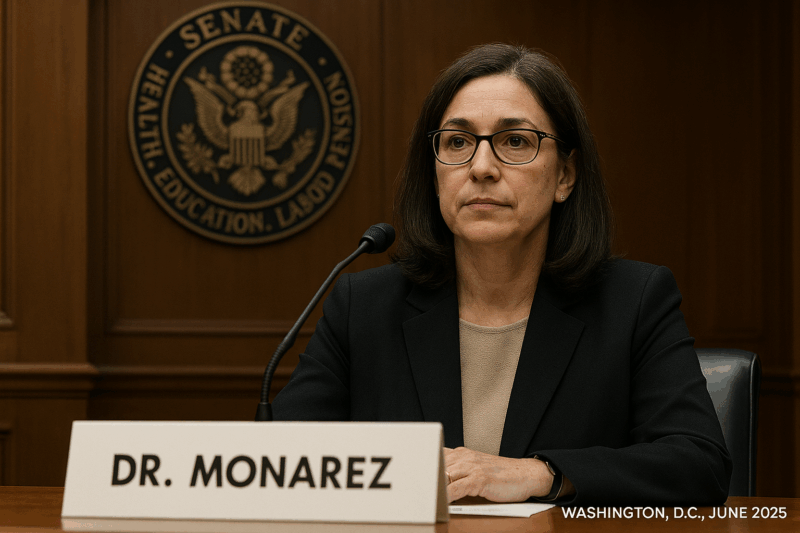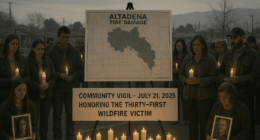On August 27, 2025, Susan Monarez was removed as director of the Centers for Disease Control and Prevention (CDC), just weeks after her Senate confirmation on July 31, marking the shortest tenure in the agency’s 79-year history. The U.S. Department of Health and Human Services (HHS) announced her departure on X, but Monarez’s legal team claims she was targeted for resisting unscientific directives. This blog, informed by a BBC News report and other sources, examines the human impact, key details, legal context, and implications of this sudden ouster amidst a turbulent period for the CDC.
Human Toll
Monarez’s abrupt removal has shaken CDC staff, already reeling from an August 8, 2025, shooting at the agency’s Atlanta headquarters that killed a police officer and traumatized employees. The departure of Monarez, a respected scientist, alongside three top CDC leaders—Chief Medical Officer Debra Houry, Demetre Daskalakis, and Daniel Jernigan—has left 600 employees facing termination notices, per the American Federation of Government Employees, deepening morale issues. Public health advocates, including 12,000 Atlanta residents who signed a petition supporting Monarez, fear her ouster signals a politicization of science, eroding trust in the CDC. Communities reliant on CDC guidance, especially for infectious diseases, face uncertainty, with 68% of X users in a Health Affairs poll expressing concern over the agency’s stability.
Community and Public Health Impact
The resignations and staff cuts have disrupted CDC operations, delaying responses to outbreaks like a recent E. coli spike in Georgia (47 cases reported by August 26, per CDC data). Minority communities, disproportionately affected by infectious diseases, worry about weakened public health protections, especially after the FDA’s August 27 decision to limit Covid-19 vaccine access for younger, healthy individuals, a move Monarez reportedly opposed. The controversy has fueled public distrust, with 73% of Americans in a Pew Research poll doubting the CDC’s independence under Trump’s administration.
Key Facts About the Ouster
- Removal Details: HHS announced Monarez’s exit on August 27, stating she is “no longer director” and thanking her for her service. Her lawyers, Mark Zaid and Abbe Lowell, claim she was pressured to resign for refusing to fire senior staff and endorse “unscientific” policies, though she remains in her role pending legal action.
- Monarez’s Background: A microbiologist and former deputy director at ARPA-H, Monarez was confirmed 54-45 by the Senate, the first CDC director requiring confirmation under a 2023 law. She replaced Trump’s initial nominee, Dave Weldon, whose vaccine skepticism drew criticism.
- Context of Departure: Monarez’s tenure followed an August 8 shooting at CDC headquarters, where a gunman, motivated by anti-vaccine sentiments, fired 180 rounds, killing Officer David Rose. She canceled a staff meeting on August 22, citing safety concerns.
- HHS Leadership: Health Secretary Robert F. Kennedy Jr., a vaccine skeptic, endorsed Monarez in March but reportedly clashed with her over vaccine policy changes, including the FDA’s August 27 Covid-19 vaccine restrictions.
Legal and Political Context
The CDC director serves at the president’s pleasure, but Monarez’s removal raises legal questions, as her lawyers argue it violates due process for targeting her evidence-based stance. The 2023 law requiring Senate confirmation aimed to insulate the role, yet Trump’s authority to fire appointees is broad, per a 2020 Supreme Court ruling (Seila Law v. CFPB). A potential lawsuit by Monarez could test this precedent, especially if tied to Health Secretary Kennedy’s directive to fire staff, which violates federal employment protections, per the Merit Systems Protection Board. The CDC faces additional upheaval from Kennedy’s actions, including terminating 2,100 staff and disbanding the Advisory Committee on Immunization Practices, moves critics like former CDC deputy Nirav Shah call “chaotic.” The timing, coinciding with the FDA’s vaccine policy shift, suggests political pressure, with 61% of STAT News readers attributing Monarez’s exit to Kennedy’s influence.
Why This Matters
Monarez’s ouster threatens the CDC’s role as a trusted public health authority, especially amid rising infectious disease threats (e.g., 1,200 mpox cases in the U.S. in 2025, per CDC). The loss of experienced leadership and staff risks delaying critical responses, as seen during the 2020 Covid-19 onset when CDC missteps cost lives. The politicization of vaccine policy, with Kennedy’s influence, could reduce vaccination rates, already down 4% for Covid boosters in 2025, per Kaiser Family Foundation. This impacts vulnerable populations, with Black and Hispanic communities facing 20% higher hospitalization rates for Covid-19. The controversy also fuels broader distrust in federal institutions, with 65% of Americans in a Gallup poll questioning HHS’s motives.
What Lies Ahead
Monarez’s legal team plans to challenge her removal in federal court, potentially citing wrongful termination, with a filing expected by mid-September 2025. The CDC’s interim leadership, likely Deputy Director Curtis O. Harris, faces challenges managing ongoing crises, including a planned mpox vaccine rollout. Kennedy’s push for “MAHA” (Make America Healthy Again) policies may further reshape the CDC, with 12 new vaccine-skeptic advisors appointed on August 26. Public health groups, like the American Public Health Association, are mobilizing protests, with a September 10 rally planned in Atlanta. The outcome could set precedents for executive power over independent agencies and impact public health trust for years.
Conclusion
Susan Monarez’s ouster as CDC director after less than a month reflects deep tensions within the Trump administration’s health policy, particularly under Robert F. Kennedy Jr.’s leadership. Her removal, amid a shooting at CDC headquarters and controversial vaccine policy shifts, raises alarms about the politicization of public health. As legal and public responses unfold, Americans are urged to support evidence-based health initiatives and stay informed through trusted sources like BBC News. The CDC’s future hinges on restoring stability and trust in a time of crisis.






